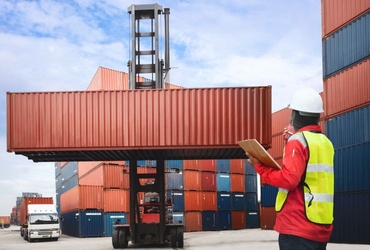
The History of Incoterms
Updated on 16 Feb 2026
5 min read
GET STARTED HERE
What do you need a quote for?

Importing/Exporting Commercial Cargo
For business shipping commercial cargo or for freight forwarders.

International Relocations/Movings
For individuals relocating to a new country or for relocation businesses.

Sending Parcels & Couriers
For businesses or individuals looking to ship small parcels or documents by air.
Introduction
Incoterms (International Commercial Terms) are standardized rules developed to clearly define the responsibilities of buyers and sellers in international trade. They set out who handles transportation, insurance, customs clearance, and the transfer of risk and cost at each stage of shipment.
First published in 1936 by the International Chamber of Commerce (ICC), Incoterms have been revised periodically to keep pace with the changing nature of global trade. Today, they are one of the most recognized standards in shipping and logistics.
Chronological Evolution
| Year / Version | Key Changes & Highlights | Notes |
|---|---|---|
| 1812 | First recorded use of "FOB" in English courts | Considered a precursor to Incoterms |
| 1936 | ICC publishes the first official Incoterms rules | Included FAS, FOB, C&F, CIF, Ex Ship, Ex Quay |
| 1953 | First revision; terms for rail transport added | "Free on Rail," "Free on Truck," "Delivered Costs Paid" introduced; EXW appears |
| 1967 | Clarifications to remove ambiguities | Adaptation to post-war trade growth |
| 1976 | "FOB Airport" added for air transport | Recognizing air freight as a growing mode |
| 1980 | Adjusted for containerized and multimodal transport | FRC/FCI evolved into FCA and CIP |
| 1990 | Focus on multimodal transport and EDI | Integration of electronic data exchange |
| 2000 | Customs and logistics procedures clarified | Simplified and streamlined applications |
| 2010 | Major overhaul: DAT and DAP introduced | Some older terms removed |
| 2020 | Current version: DAT replaced with DPU; CIP insurance coverage raised | Increased digitalization, updated guidance notes |
Objectives and Core Concepts
Objectives of Incoterms
- Clearly allocate obligations between seller and buyer
- Define the point where risk transfers from seller to buyer
- Minimize disputes and misunderstandings in cross-border trade
- Provide a universally accepted framework for shipping contracts
Core Concepts
- Delivery: The point at which risk passes from seller to buyer
- Carrier: The party responsible for transporting goods
- Terminal: Any location where goods are transferred or unloaded (port, warehouse, container yard)
- Insurance: Only compulsory under CIF and CIP terms
Key Changes in Incoterms 2020
- DAT (Delivered at Terminal) removed; replaced with DPU (Delivered at Place Unloaded) to allow delivery at any location, not only terminals
- CIP (Carriage and Insurance Paid To) now requires a higher (A-level) insurance cover compared to previous editions
- Digital and electronic document usage encouraged
- Each Incoterm now includes detailed "Guidance Notes" to simplify application
Incoterms 2020 Overview Table
| Term | Transport Mode | Seller's Cost & Risk Responsibility | Highlights |
|---|---|---|---|
| EXW (Ex Works) | Any mode | Seller's responsibility ends when goods are made available at their premises | Buyer bears all costs and risks |
| FCA (Free Carrier) | Any mode | Seller delivers goods to the carrier at a named place | Risk passes at delivery to carrier |
| CPT (Carriage Paid To) | Any mode | Seller pays freight to destination; risk transfers at handover to carrier | Freight paid, risk passes earlier |
| CIP (Carriage & Insurance Paid To) | Any mode | Seller pays freight and insurance | A-level insurance required since 2020 |
| DAP (Delivered At Place) | Any mode | Seller covers all costs up to named place; buyer handles import customs | Unloading at buyer's cost |
| DPU (Delivered at Place Unloaded) | Any mode | Seller delivers and unloads goods at named place | Replaced DAT in 2020 |
| DDP (Delivered Duty Paid) | Any mode | Seller covers all costs including import customs | Buyer has no obligations |
| FAS (Free Alongside Ship) | Sea/inland waterway | Seller places goods alongside the vessel | Loading is buyer's responsibility |
| FOB (Free On Board) | Sea/inland waterway | Seller delivers goods on board the vessel | Risk transfers once loaded |
| CFR (Cost and Freight) | Sea/inland waterway | Seller pays freight; risk transfers at loading | Insurance not included |
| CIF (Cost, Insurance & Freight) | Sea/inland waterway | Seller pays freight and minimum insurance | Risk transfers at loading; buyer gets basic cover |
Check all incoterms in our help page for more details.
Notes:
- Sea-only terms (FAS, FOB, CFR, CIF) should not be used for containerized or multimodal shipments.
- Customs clearance responsibilities vary; D-terms (DAP, DPU, DDP) place more obligations on the seller.
- Insurance is mandatory only under CIF and CIP.
Future Outlook of Incoterms
- New transport technologies: Drones, autonomous vehicles, and new multimodal systems may drive future revisions
- Digitalization and security: Blockchain, IoT, and e-documentation will make Incoterms more transparent and traceable
- Sustainability focus: Pressure to integrate environmental considerations and carbon reporting may shape future rules
References
Related Articles


